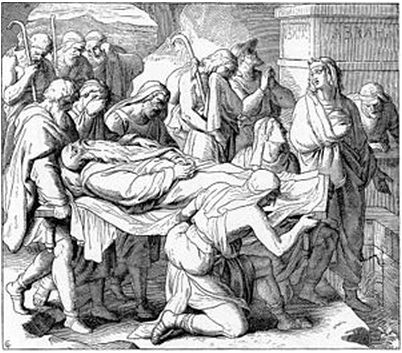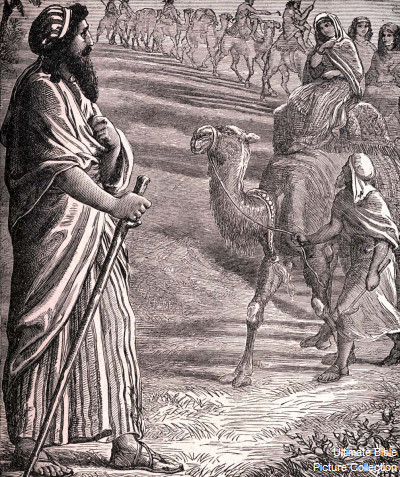21 Tell me, you who desire to be under the law, do you not listen to the law? 22 For it is written that Abraham had two sons, one by a slave woman and one by a free woman. 23 But the son of the slave was born according to the flesh, while the son of the free woman was born through promise. 24 Now this may be interpreted allegorically: these women are two covenants. One is from Mount Sinai, bearing children for slavery; she is Hagar. 25 Now Hagar is Mount Sinai in Arabia; she corresponds to the present Jerusalem, for she is in slavery with her children. 26 But the Jerusalem above is free, and she is our mother. 27 For it is written,
“Rejoice, O barren one who does not bear;
break forth and cry aloud, you who are not in labor!
For the children of the desolate one will be more
than those of the one who has a husband.”
28 Now you, brothers, like Isaac, are children of promise. 29 But just as at that time he who was born according to the flesh persecuted him who was born according to the Spirit, so also it is now. 30 But what does the Scripture say? “Cast out the slave woman and her son, for the son of the slave woman shall not inherit with the son of the free woman.” 31 So, brothers, we are not children of the slave but of the free woman. – Galatians 4:21-31 ESV
One of the dangers of biblical interpretation is taking what was meant to be literal and making it allegorical. This is most often done when a passage contains a difficult or controversial message. A literal translation may present the reader with certain problems that can easily be rectified by a rendering that is allegorical or figurative in nature.
Since the Bible is comprised of a variety of literary styles, such as history and poetry, and some passages are allegorical in nature, it can be tempting to interpret what God intended to be taken as literal and to force upon it an allegorical meaning. Another thing that can make reading and interpreting the Bible difficult is that some passages have both literal and allegorical messages within them. Paul provides us with a case in point. In his defense of justification by faith alone in Christ alone, Paul uses the historical account of the births of Ishmael and Isaac to explain the true nature of the law and man’s relationship to it.
Paul somewhat sarcastically asked his readers, who seemed to be set on living according to the law, why they refused to listen to what the law said. He then tells the story of the birth of Abraham’s two sons, found in the book of Genesis, located in the “law” section of the Old Testament. When a Jew referred to “the book of the law,” he was referring to not only the Mosaic law but to the Pentateuch, the first five books of the Bible as we know it today.
The Genesis account tells of the birth of Ishmael to Abraham through his wife’s handmaiden, Hagar. This had been the result of Sarah’s attempt to help God fulfill His promise to give Abraham a son. The only problem was that it was not according to God’s plan. Sarah had viewed her barrenness as a problem too big for God to handle, so she intervened and encouraged Abraham to have a child with Hagar. But Paul pointed out that Ishmael, “the son of the slave was born according to the flesh” (Galatians 4:23 ESV).
Paul’s emphasis was that Ishmael’s birth was of the flesh or natural, and as the son of a slave woman, his relationship to Abraham would be completely different than that of Isaac. God had told Abraham that Ishmael would not be an acceptable substitute or stand-in as his heir.
“As for Ishmael, I have heard you; behold, I have blessed him and will make him fruitful and multiply him greatly. He shall father twelve princes, and I will make him into a great nation. But I will establish my covenant with Isaac, whom Sarah shall bear to you at this time next year.” – Genesis 17:20-21 ESV
God had promised to give Abraham an heir through Sarah, despite her barrenness, and God supernaturally intervened and made it possible for Sarah to conceive and bear Abraham a son. Isaac’s birth was the direct fulfillment of God’s long-standing promise to Abraham.
Go from your country and your kindred and your father’s house to the land that I will show you. And I will make of you a great nation, and I will bless you and make your name great, so that you will be a blessing. – Genesis 12:1-2 ESV
As for Sarai your wife, you shall not call her name Sarai, but Sarah shall be her name. I will bless her, and moreover, I will give you a son by her. I will bless her, and she shall become nations; kings of peoples shall come from her. – Genesis 17:15-16 ESV
And Abraham said to God, “Oh that Ishmael might live before you!” God said, “No, but Sarah your wife shall bear you a son, and you shall call his name Isaac. I will establish my covenant with him as an everlasting covenant for his offspring after him.” – Genesis 17:18-19 ESV
Ishmael, the son of the slave woman, was not to be Abraham’s heir. That right and responsibility would go to Isaac, the son of the promise. It is at this point that Paul reveals the allegorical or figurative message found in this literal, historical recounting of the births of Ishmael and Isaac.
Now this may be interpreted allegorically: these women are two covenants. – Galatians 4:24 ESV
Under the inspiration of the Holy Spirit, Paul provides an analogy or illustration of what these historical events represent or foreshadow. Ishmael represented the covenant of the law given at Mount Sinai. According to Paul, Ishmael was born “according to the flesh,” a clear indication that his birth was not part of God’s plan. Ishmael was the result of Sarah’s ingenuity and Abraham’s compliance, therefore, he was disqualified from becoming the fulfillment of God’s promise.
The law, though given by God, was completely dependent upon man’s ability to live up to it. It was based on self-reliance. God never intended the law to result in man’s justification; it simply revealed and exposed the depths of man’s sinfulness. The law enslaved men under sin. It condemned them for their sin but could do nothing to relieve them from its control over their lives. That is, until Christ came.
But when the fullness of time had come, God sent forth his Son, born of woman, born under the law, to redeem those who were under the law, so that we might receive adoption as sons. – Galatians 4:4-5 ESV
At one point, Jesus had told the Pharisees, the experts in the Mosaic law, “Truly, truly, I say to you, everyone who practices sin is a slave to sin. The slave does not remain in the house forever; the son remains forever. So if the Son sets you free, you will be free indeed” (John 8:34-36 ESV).
Paul was attempting to contrast Judaism with Christianity and compare life under the law with a life lived according to faith. Paul wanted his readers to know that they were children according to the promise. They had been freed from the onerous task of attempting to keep the law in an ill-fated effort to earn a right standing before God. Jesus Christ had died to set them free and to justify them before God according to His works, not theirs. So why would they ever want to revert to a life of trying to keep the law?
Ishmael would not share in the inheritance promised by God to Abraham’s heir, and those who attempt to live by keeping the law through dependence upon their own self-effort will not inherit eternal life. That gift is reserved for those who place their faith in the sacrificial death of God’s Son, who was the ultimate fulfillment of the promise. Paul made that point earlier in his letter.
Now the promises were made to Abraham and to his offspring. It does not say, “And to offsprings,” referring to many, but referring to one, “And to your offspring,” who is Christ. – Galatians 3:16 ESV
Paul’s entire point is that the promise preceded the giving of the Law, and it came through the line of Isaac, not Ishmael. Jesus would be a descendant of Jacob, the son of Isaac. The opening verse of Matthew’s gospel spells out Jesus’ line of descent.
The book of the genealogy of Jesus Christ, the son of David, the son of Abraham. – Matthew 1:1 ESV
Matthew goes on to qualify Jesus’ fulfillment of the promises made to Abraham by revealing His direct line of descent from the patriarch of the Hebrew people. He came through the line of Isaac, not Ishmael, therefore, He was a Son of the promise.
Paul’s allegorical take on this historical event does not change any of the details concerning the births of Isaac and Ishmael, but it does provide vital clarification concerning the future implications of this Old Testament story. Ishmael’s birth was the result of Abraham and Sarah trying to help God out. Ishmael was born to Hagar, whom Paul compares to Mount Sinai, where the Mosaic Law was given. Hagar was an Egyptian who served as a personal slave to Sarah. She represents those who were required to live under the law. But Sarah was a free woman who represented all those who lived according to the promise. Hagar is a symbol of the earthly Jerusalem which, in Paul’s day, was enslaved to the Romans and still held captive by the law. But Sarah represents the heavenly Jerusalem, where the children of God live in the freedom provided for them by Jesus Christ.
Paul knew that the temptation toward legalism and self-reliance was alive and well in Galatia. It had been brought in by the Judaizers, who were persecuting the Gentile believers by demanding their conversion to Judaism and their strict adherence to the Mosaic Law. These Gentile believers were under tremendous pressure to earn favor with God through their own self-effort. But Paul wanted them to remember that they were called to live their lives by faith. They were to trust in God and His indwelling Holy Spirit, not in their weak and frail flesh.
Paul wanted them to embrace the same attitude he had when it came to the freedoms found in Jesus Christ.
It is no longer I who live, but Christ lives in me. So I live in this earthly body by trusting in the Son of God, who loved me and gave himself for me. – Galatians 2:20 NLT
English Standard Version (ESV) The Holy Bible, English Standard Version. ESV® Permanent Text Edition® (2016). Copyright © 2001
New Living Translation (NLT) Holy Bible, New Living Translation, copyright © 1996, 2004, 2015 by Tyndale House Foundation. Used by permission of Tyndale House Publishers Inc., Carol Stream, Illinois 60188. All rights reserved.




